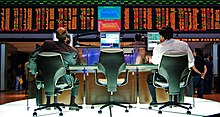Portal:Business
The Business and Economics Portal Business is the practice of making one's living or making money by producing or buying and selling products (such as goods and services). It is also "any activity or enterprise entered into for profit." A business entity is not necessarily separate from the owner and the creditors can hold the owner liable for debts the business has acquired. The taxation system for businesses is different from that of the corporates. A business structure does not allow for corporate tax rates. The proprietor is personally taxed on all income from the business. A distinction is made in law and public offices between the term business and a company such as a corporation or cooperative. Colloquially, the terms are used interchangeably. (Full article...) Economics (/ˌɛkəˈnɒmɪks, ˌiːkə-/) is a social science that studies the production, distribution, and consumption of goods and services. Economics focuses on the behaviour and interactions of economic agents and how economies work. Microeconomics analyses what is viewed as basic elements within economies, including individual agents and markets, their interactions, and the outcomes of interactions. Individual agents may include, for example, households, firms, buyers, and sellers. Macroeconomics analyses economies as systems where production, distribution, consumption, savings, and investment expenditure interact, and factors affecting it: factors of production, such as labour, capital, land, and enterprise, inflation, economic growth, and public policies that have impact on these elements. It also seeks to analyse and describe the global economy. (Full article...) Selected articleSeacology is a nonprofit 501(c)(3) charitable organization headquartered in Berkeley, California that focuses on preserving island ecosystems and cultures around the world. Founded in 1991, it began with the work of ethnobotanist Paul Alan Cox, who researched tropical plants and their medicinal value in the village of Falealupo in Samoa during the mid-1980s. When the villagers were pressured into selling logging rights to their rainforest in 1988 to build a new school, Cox and his wife offered to help secure funds for the new school in return for an agreement with the villagers to protect their forest. With the help of his friends and family, Cox secured the funds within six months, later earning him and the village chief, Fuiono Senio, the Goldman Environmental Prize for their efforts. Word spread throughout the islands, and with increasing demand for similar projects, Cox, along with Bill Marré and Ken Murdock, decided to form Seacology and expand their work internationally. Selected image
Selected economy São Paulo is one of the largest cities in the world economically, and is expected to be the 6th largest in 2025. According to data of Fecomercio/SP, its gross domestic product (GDP) in 2017 was R$699.28 billion ($219.11B today). The biggest financial center in Brazil and one of the biggest financial centers in the world, São Paulo's economy is going through a deep transformation. Once a city with a strong industrial character, São Paulo's economy has become increasingly based on the tertiary sector, focusing on services and businesses for the country. The city is also unique among Brazilian cities for its large number of foreign corporations. Many analysts point to São Paulo as an important global city, even though this assignment can be criticized considering its serious problems of social exclusion and spatial segregation. Although being the most important financial centre of the country, São Paulo also presents a high degree of informality in its economy. (Full article...) Selected quoteIt can readily be seen that such a plan of management as this will bring out co-operation as would no other plan; and it should be stated here emphatically that there is nothing that can permanently bring about results from scientific management, and the economies that it is possible to effect by it, unless the organization is supported by the hearty co-operation of the men. Without this there is no scientific management. Moreover, since the conditions which bring about the cooperation are measured and standardized, the result is stable. Co-operation without standardization is a most unstable thing, likely to disappear at any moment with a change of the individuals supposed to co-operate.
TopicsRelated WikiProjectsDid you know (auto-generated) -
On this day in business history
General imagesThe following are images from various business-related articles on Wikipedia.
More did you know
Business news
SubcategoriesRelated portals
Things you can doUrgent and important articles are bold
WikimediaThe following Wikimedia Foundation sister projects provide more on this subject:
SourcesDiscover Wikipedia using portals |
- Portals with triaged subpages from June 2018
- All portals with triaged subpages
- All portals
- Portals with no named maintainer
- Random portal component with over 50 available subpages
- Business and economics portal
- Random portal component with 26–30 available image subpages
- Random portal component with more available subpages than specified max
- Random portal component with 11–15 available subpages
- Society portals
- Business
- Redirect targets of redirected portals with existing subpages





































